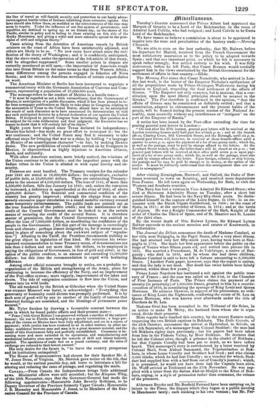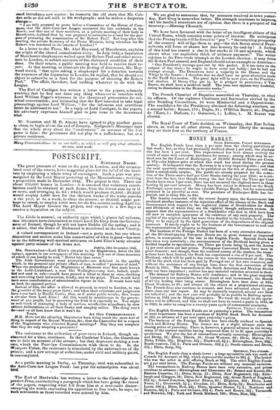Tuesday's Gazette announced that Prince Albert had appointed the Marquis
of Granby to be a Lord of the Bedchamber, in the room of Admiral Lord Colvile, who had resigned ; and Lord Colvile to be Extra Lord of the Bedchamber.
We have reason to believe a commission is about to be appointed to inquire into the state and peculiarities of the hosiery trade.—.Morning Chronicle.
We are able to state on the best authority, that Mr. Bulwer, before his departure for Madrid, received from the French Government the most satisfactory assurances as to the policy to be adopted towards Spain ; and that one important point, on which he felt it necessary to speak rather strongly, was settled entirely to his wish. It was fully understood, before he left Paris, that Count Bresson would cordially support him in the views entertained by the British Government for the settlement of affairs in that country.—Globe.
The Morning Post states that Count Nesselrode, who arrived 'in Lon- don last week, is the bearer of the Emperor Nicholas's ratifications of all the propositions made by Prince Oettingen Wallerstein during his mission to England, respecting the final settlement of the affairs of Greece. "The Emperor not only consents, but is anxious, that a con- stitution upon the most liberal principles should be secured to the Greeks." The Post therefore is confirmed in the opinion, "that the affairs of Greece may be considered as definitely settled ; and that a constitution, adapted to circumstances and the present habits of the people, will be framed during the present session of the National As- sembly, most assuredly without any interference or ' intrigues ' on the part of the Emperor of Russia."
A notice has been issued by the Post-office extending the time for posting general post letters in London-
" On and after the 27th instant, general post letters will be received at the London receiving-houses until half-past five o'clock p. m. ; and at the branch offices, Charing Cross, Old Cavendish Street, and the Borough, until six p.m. General post letters will, however, be received at these branch-offices until a quarter to seven p. m. upon the payment of a fee of one penny each; which fee, as well as the postage, must be paid by stamps affixed to the letters. At the Lombard Street branch-office, the letter-boxes will be closed at six p.m.; but general post letters will be received at that office until seven p. m. upon pay- ment of a fee of one penny each ; which fee, as well as the postage, must also be paid by stamps affixed to the letter. Upon foreign, colonial, or ship letters, the postage and fee may be paid by stamps or in money, at the option of the sender. It must be distinctly understood that this arrangement does not ex- tend to newspapers."
After visiting Birmingham, Hartwell, and Oxford, the Duke of Bor- deaux returned to town on Saturday, and received more deputations from France. He left town again on Wednesday, for Bath, to visit the Western and Southern counties.
The Navy has lost a veteran in Vice-Admiral Sir Edward Brace ; who died at Sheerness Admiralty House on Tuesday, after a short but severe illness. He had been in the Navy fifty-three years. He distin- guished himself in the capture of the Loire frigate, in 1798; in an en- counter with the Dutch frigate Guilderland, in 1808; on the coast of Spain, in 1811; at the surrender of Genoa, in 1814; and at the battle of Algiers. He was a Knight Commander of the Bath, Knight of the order of Charles the Third of Spain, and of St. Maurice and St. Lazare of the third class.
By the recent death of Mrs. Bulwer Lytton, Sir Edward Lytton Bulwer succeeds to the ancient mansion and estates of Knebworth, in Hertfordshire.
The Journal des Dilmts announces the death of Madame Catalani, at her villa near Sinigaglia, in the Papal States, after a very short illness. She had attained only her fifty-ninth year, having been born at Sini- gaglia in 1784. She made her first appearance before the public on the stage of Venice when fifteen years old, and retired into private life in 1831. She married a Frenchman, M. de Valebrique, a native of Bar- gaudy; who died in 1838, and by whom she had three children. Madame Catalani is said to have left a fortune amounting to 8,300,000 francs. [Another Paris paper, however, says that the report is untrue, and that the lady is not dead. Her death has twice before been falsely reported, within these few years.]
Prince Louis Napoleon has instituted a suit against the public trea- sury of France ; and the case was called on the 21st, in the Chamber of First Instance of Paris. The Prince claims the payment of an annuity (in perpetuity) of 1,800,000 francs, granted to him by a senalds- consultum of 1810, in constituting the apanage of King Louis and Queen Hortense. He adduces likewise, in support of his pretensions, an ordi- nance of King Louis the Eighteenth, conferring the estate of St. Leu on Queen Hortense, who was known ever afterwards under the title of Dutchess de St. Lea.
Madame Grisi has been nonsuited in the Tribunal of the Seine, in an action to make M. Melcy, the husband from whom she is sepa. rated, divide their property. More reports have reached this country, by the recent Eastern mails, respecting the two British captives in Bokhara. The Delhi Gazette, of the 28th October, announces the arrival at Hyderabad, in Seinde, on the 6th September, of a messenger from Colonel Stoddart : the man had left Bokhara eighty days previously ; but his papers had been taken from him in the Pisheen Valley, by Meer Delkhan. He declares that he left the Colonel alive, though a prisoner in the citadel of Bokhara ; but that Captain Conolly had been put to death, as we have before heard. This messenger's story is corroborated by a letter received by Colonel Sheil, from Abdool Summand, the Topcheebathee at Bok- bars, in whose house Conolly and Stoddart had lived ; and who claim 3,000 tillahs, which he had lent Conolly ; as a voucher for which, Stod- dart had supplied him with a leaf from out of Conolly's journal ; which, it is presumed, he would not have done had the Captain been alive. Dr. Wolff arrived at Trebizond on the 27th November. He was sup- plied with a letter from the Sultan Abd-ul-Medjid to the Khan of Bok- hara, urging, in a style of persuasion rather than command, the release of the prisoners.
Alderman Brooks and Mr. Buafield Ferrand have been carrying on, in letters to the Times, the dispute which they began at a public meeting in Manchester lately ; each sticking to his own version ; but Mr. Fer- rand introduces new matter : he reasserts the old story that Mr. Cob- den sells or did sell milk to his workpeople; and he makes a desperate ebarge- " 1 am fully prepared to prove before a Committee of the House of Com- mons, that the Anti-Corn-law League concocted the late outbreaks in the North ; and that one of their members, at a private meeting of their body in Manchester, declared that he was prepared to subscribe to a fund for the pur- pose of procuring the avsassination of Sir Robert Peel! Not long after this meeting, the private Secretary of the Prime Minister, being mistaken for Sir Robert, was murdered in the streets of London!"
tin a letter to the Times, Mr. Abel Hey wood, of Manchester, explains the origin of the absurd assassination-story. In July 1842,a deputation of Manchester shopkeepers waited upon Sir Robert Peel and other states- men in London, to submit accounts of the distressed condition of their dlass. On their return, a public meeting was held to receive their re- port. At that meeting, to illustrate the feeling of discontent, Mr. Hey- wood stated, "that upon asking a shopkeeper for a donation towards the expenses of the deputation to London, he replied, that he should not object to subscribe to a fund for the purpose of shooting Sir Robert Peel." The affair, therefore, had nothing whatever to do with the League.
The Earl of Cardigan has written a letter to the papers, solemnly averring that he had not done any thing whatever to interfere with Lord William Paget's witnesses in the threatened prosecution for cri- minal conversation; and intimating that the Earl intended to take legal proceedings against Lord William, "for the infamous and scurrilous letter he addressed to me." In a reply at Lord Cardigan, in the papers, his adversary expresses himself glad to join issue in the threatened trial.
Mr. Staunton and M. St. Amant have agreed to play another game at chess, to begin about the end of January. Galignani's Messenger says that the whole story about the " excitement " on account of the last game is false : the gentlemen did not play in a coffeehouse, but at a private residence.























 Previous page
Previous page